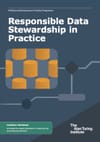📘 What’s Covered
The workbook is part of a broader series on AI ethics and governance, developed for UK public sector bodies. It serves both as a facilitator guide and a participant manual, blending theoretical groundwork with practical exercises. The focus is on helping civil servants and AI ethics champions understand and apply responsible data stewardship in real-world contexts.
Key Concepts Section:
- Introduces the data lifecycle, showing its iterative and interconnected stages—from planning and collection to reuse and decommissioning (visualized on page 11).
- Breaks down the three pillars of responsible data stewardship:
- Data Integrity: Ensures traceability, contemporaneity, and auditability.
- Data Quality: Covers accuracy, representativeness, fitness for purpose, and relevance.
- Data Protection & Privacy: Anchored in legal frameworks like the GDPR, highlighting consent, transparency, security, and proportionality.
- Emphasizes data equity (pp. 21–22), linking stewardship to social justice by acknowledging and mitigating bias in data sources and uses—particularly in policing contexts.
Practice Section:
- Offers a detailed Data Factsheet template (pp. 27–43) to be completed at various AI lifecycle stages. This template encourages reflection on project-specific data issues, ensuring ongoing scrutiny of risks like bias, security, and consent.
- Encourages continuous use of the Factsheet as a live document, supporting iterative improvement over time.
Workshop Activities (pp. 45–57):
- Designed around real-world public sector scenarios, including a case study on facial recognition in policing.
- Activities help teams critically assess data risks, link stewardship to public interest, and collaboratively complete parts of the Data Factsheet.
Appendix A (pp. 58–61):
- Tackles current challenges posed by generative AI and large-scale uncurated datasets.
- Outlines serious risks like data poisoning, privacy breaches, and representational harm in foundation model training, connecting these back to the need for robust data stewardship.
💡 Why it matters? (500–600 characters)
Too often, data governance in AI projects is reactive or fragmented. This workbook flips the script by offering a structured yet flexible way to proactively build stewardship into every stage of an AI project. It stands out for its accessibility (no jargon overload), focus on real-life case studies, and clear links to legal, ethical, and social accountability. It’s especially timely given rising public concern over AI deployments in sensitive areas like law enforcement and healthcare.
🔍 What’s Missing
While comprehensive, the workbook could benefit from deeper discussion on:
- The tensions between open data practices and privacy (especially in contexts like public surveillance).
- Interoperability challenges when stewarding data across different government systems.
- Concrete examples of failed stewardship—learning from what went wrong could make the workbook even stronger.It also assumes some familiarity with AI systems, which may be a hurdle for non-technical participants.
🧑💼 Best For
Ideal for civil servants, policy advisors, and public sector technologists working on AI-enabled services. Also useful for ethics officers and project leads who want a practical toolkit to ensure data handling aligns with legal duties and public expectations. Equally relevant for NGOs focused on government accountability.
🗂️ Source Details
Title: Responsible Data Stewardship in Practice
Publisher: The Alan Turing Institute
Series: AI Ethics and Governance in Practice Programme
Date: 2024, Version 1.2
Authors: David Leslie et al.
Access: aiethics.turing.ac.uk


